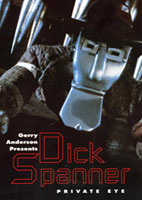This article needs additional citations for verification .(December 2007) |
| Dick Spanner, P.I. | |
|---|---|
 Promotional image featuring the title character, Dick Spanner | |
| Genre | Science fiction comedy Crime comedy Detective fiction Police procedural Parody |
| Created by | Terry Adlam |
| Written by | Tony Barwick |
| Directed by | Terry Adlam Steve Begg |
| Voices of | Shane Rimmer |
| Music by | Christopher Burr |
| Country of origin | United Kingdom |
| Original language | English |
| No. of series | 1 |
| No. of episodes | 22 (4 in alternative 24‑minute format) |
| Production | |
| Producers | Gerry Anderson Christopher Burr |
| Cinematography | Steve Begg Paddy Seale |
| Animator | Mark Woollard |
| Editor | Jack Gardner |
| Running time | 6 minutes |
| Production company | The Anderson Burr Partnership |
| Original release | |
| Network | Channel 4 |
| Release | 3 May – 27 September 1987 [1] |
Dick Spanner, P.I. is a 1987 British stop-motion animated comedy series which parodied Chandleresque detective shows. [2] The title character and protagonist was Dick Spanner, voiced by Shane Rimmer, a robotic private detective who works cases in a futuristic urban setting. The show made frequent use of puns and visual gags. [2]
Contents
The series consisted of 22 six-minute episodes, covering two-story arcs of equal length: "The Case of the Human Cannonball" and "The Case of the Maltese Parrot". [3] The programme was originally broadcast in the United Kingdom as a segment of the Sunday morning show Network 7 on Channel 4, and was later repeated on the same channel in a late night spot.
Produced by Thunderbirds creator Gerry Anderson, the series was created and written by Terry Adlam, who had previously worked on effects for Anderson's Terrahawks . [4] It was also the basis for the Anderson-created Tennents Pilsner advertising campaign using the Lou Tennent character (voiced by Vivian Stanshall).